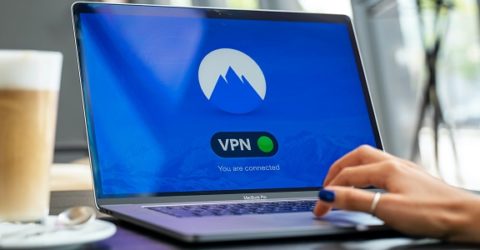A beginner’s guide to VPNs
Virtual Private Networks offer a valuable security blanket, but knowing how and when to use a VPN isn’t always obvious

There’s a common assumption among consumers that the information they upload and download through their domestic internet accounts is completely confidential.
Sadly, this is not the case.
Your ISP can monitor the sites you visit, both in terms of managing parental control settings, and also to check you’re not doing anything illicit or against a particular website’s rules.
Web browsers rarely forget either, since browsing histories are highly valuable pieces of data, endlessly resold and reused by marketing companies around the world.
Worst of all, the typical home broadband connection is easily spied upon. Someone in a van outside your house with some low-tech monitoring equipment could monitor every keystroke.
In reality, everything you do through a web browser is tracked, monitored and recorded. Plus, it’s vulnerable to rogue agents intercepting and monitoring it.
For this reason, a growing number of consumers have installed virtual private networks – abbreviated to VPNs.
But what are these networks? How do they work, what do they achieve, and when might using one be advantageous or advisable?
Virtual insanity
A normal web browsing session is akin to leaving your house and walking to the house across the street. Traffic whizzes in both directions – you can see it, and it could potentially see you.
Now imagine there’s a secure tunnel connecting your house to the front door of the house across the street. You’re making the same journey, but you’re hidden from view.
At a basic level, this is analogous to a VPN. Once a network has been established, you could easily forget it’s there. However, everything you do is now screened from view.
Instead of data going from your broadband router directly to the host server containing whatever information you’re viewing, it’s rerouted through the VPN’s secure servers.
This disguises your identity. You’re still accessing the same host servers, exchanging the same information, but they have less information about who and where you are.
Critically, while normal internet connections are easy to intercept and spy upon, VPNs use complex algorithmic encoding to identify each end of the connection.
Data is only sent after it’s been scrambled, and a detailed cryptographic key means only the recipient device understands how to decrypt the original data packets to make sense of them.
You’ll also receive far less targeted advertising because your activities can’t be tracked or identified, while many VPNs additionally sport integrated ad-blocking technology.
Why is VPN technology beneficial?
There are many reasons why VPNs are useful, including the following:
Geolocation spoofing. Content providers may decide that people outwith a certain geographic area can’t watch/listen to live events, often for fairly spurious reasons.
That’s unfair on people who already pay for coverage through their subscriptions, yet are excluded from enjoying content due to local licensing restrictions where they happen to be.
A VPN disguises your location, usually letting you specify which country you’d like the network to pretend you’re based in. This neatly circumvents geolocation restrictions.
Insecure WiFi hotspots. Many public buildings and hospitality venues offer free WiFi, but these open networks are easily intercepted, and data sent across them isn’t secure.
That’s a major problem if you need to use them for online banking, confidential work assignments or other internet activities which shouldn’t be publicised.
Opening a VPN still allows you to tap into free or open WiFi, but it helps to protect your device against phishing attacks, botnets and other malicious threats.
Accessing secure networks. Employers often use VPNs as connection points for remote-working (and even office-based) staff as they log onto intranets and corporate networks.
Financial and legal firms handle particularly complex, sensitive information on behalf of their clients. This could be immensely damaging if it became public or got hacked.
When staff log in through VPNs, their data is securely shared between their terminal and the network. Nobody else can intercept it, view it, compromise it or steal it.
VPN jargon-buster
The nature of VPNs means they involve a fair amount of technical jargon. Below, we’ve listed some plain-English translations for key terminology:
How do I find and choose a VPN?

VPNs are pieces of software, which you download and install onto your devices like any other smartphone app or PC/Mac utility.
In the same way ten houses along a street can all be radically different, there can be significant differences between one VPN and the next.
App stores are full of VPNs, while our sister site VPNs.co.uk has a comprehensive list of VPN providers. You can organise them by rating, security and streaming performance.
It’s also possible to rank them by price – some basic VPNs are free, whereas others command a fee.
This isn’t surprising, since VPNs require a fair amount of network hardware and infrastructure to operate.
Some free services rely on pop-up advertising, which may be intrusive – and rather ironic considering VPNs are supposed to shield us from tracking cookies and suchlike.
A paid VPN service should have a no-logs policy, whereas free services may retain usage logs.
This flies in the face of VPN principles, and we’d recommend avoiding any services which state they will retain (even ‘basic’) usage logs on individual user activities.
Installing a VPN is straightforward. Smartphone apps need to be opened before you go online through your normal web browser, while web browser plugins also require activation.
The VPN won’t work unless it’s started up – it doesn’t detect a web browser coming to life and instantly deploy – and you can deactivate it at any time by closing the app or program.
Are VPNs like the Tor browser?
In principle, yes. Both ensure data can’t be tracked as it leaves and arrives at your device. Unless you log into a website, your activities will remain confidential.
However, Tor is a dedicated web browser, part-created (and part-funded) by the American military. VPNs are commercial pieces of software which have to be manually opened and closed.
Where VPNs create a secure and rapid connection, Tor randomly bounces individual data packets around so they’re untraceable. This makes it very slow, and unsuitable for streaming.
With one or two exceptions, VPNs can’t view the unregulated Dark Web, whereas Tor is designed for viewing .onion websites beyond the reach of Google and Bing, Safari and Opera.
Tor never retains tracking data or session logs, where some VPN providers do. That’s why choosing a privacy-focused VPN is so important.
Tor isn’t great on smartphones and Mac computers, but a VPN should run equally efficiently on almost any desktop or mobile device, regardless of its operating system.






